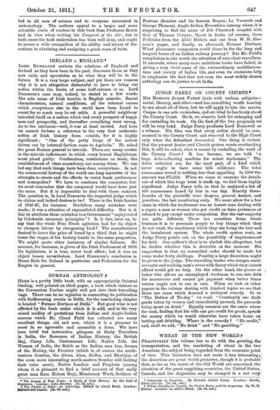. . ,
JUDGE PARRY ON COUNTY COURTS.* HIS HONOUR JUDGE Penni- deals with various subjeets--.- social, literary, and other—and has something worth hearing to say about all of them, but we will apply to him the maxim Claque in ma ark ereclendum, and see what he has to say abou4 the County Court. He la, We obsefie, both for enlarging and for curtailing its work. 04 the Aral at the two Proposals we will be very brief. Judge Parry produces Lord BramWell as a witness. His idea was that every action shonld be oath- menoed in the County Court and removed to the High. Court only when the defendant demanded. One thing is certain that the present Assize and Circuit system wants oaeithaulin g But, it will be asked, what is meant by curtailing the work of the Bounty Court It has become, we are fold, "a huge debt-collecting machine for reinoi. tradesniezi." The debts collected are, for the most part, of a hind Which never ought to have come into ail:Renee. The total summonses issued is nothing less than appalling. In 1909-the amount was 375,254. When we come to examine the details out of which this huge total is Made up, we find them highly, significant. Judge Parry tells us that he analysed a list Cr 460 summonses heard by him in one day. Exactly three- fourths of the plaintiffs were drillers, general dealers, and jewellers, the last numbering sixty. We must allow for a few cases in which the tradesman was an honest man dealing with a rogue, a man or woman who got credit on false pretences oi refused to pay except under compulsion. But the vast majority are quite different. There are countless firths whose business it is to persuade people to bay thingi which they do not want, the machinery which they use being the hire and the instalment system. The whole credit system rests, an Judge Parry points out, on the possibility of imprisonment for debt. Our author's ideal is to abolish this altogether, but he doubts whether this is desirable at the moment. Hid suggestion is that no committal order should be made for sums Under forty shillings. Possibly a large discretion might be given to the judge. The travelling trader who tempts maid- servants and working men's wives with finery which they cannot afford would get no help. On the other hand, the grocer or baker who allows an unemployed workman to run into debt for necessaries and cannot get payment when better times return ought not to sue in vain. When we look at other papers in the volume dealing with kindred topics we see that there are cases which demand a stringent remedy. So in. "The Debtor of To-day " we read.: " Constantly one finds' goods taken by women and immediately pawned, the proceeds being spent on drink." Equally common are the cases where the man, finding that his wife can get credit for goods, spends' the money which he would otherwise have taken home on betting arid drinking. Where is the remedy P " No credit," and, shall we add, "No drink" and "No gambling."














































 Previous page
Previous page